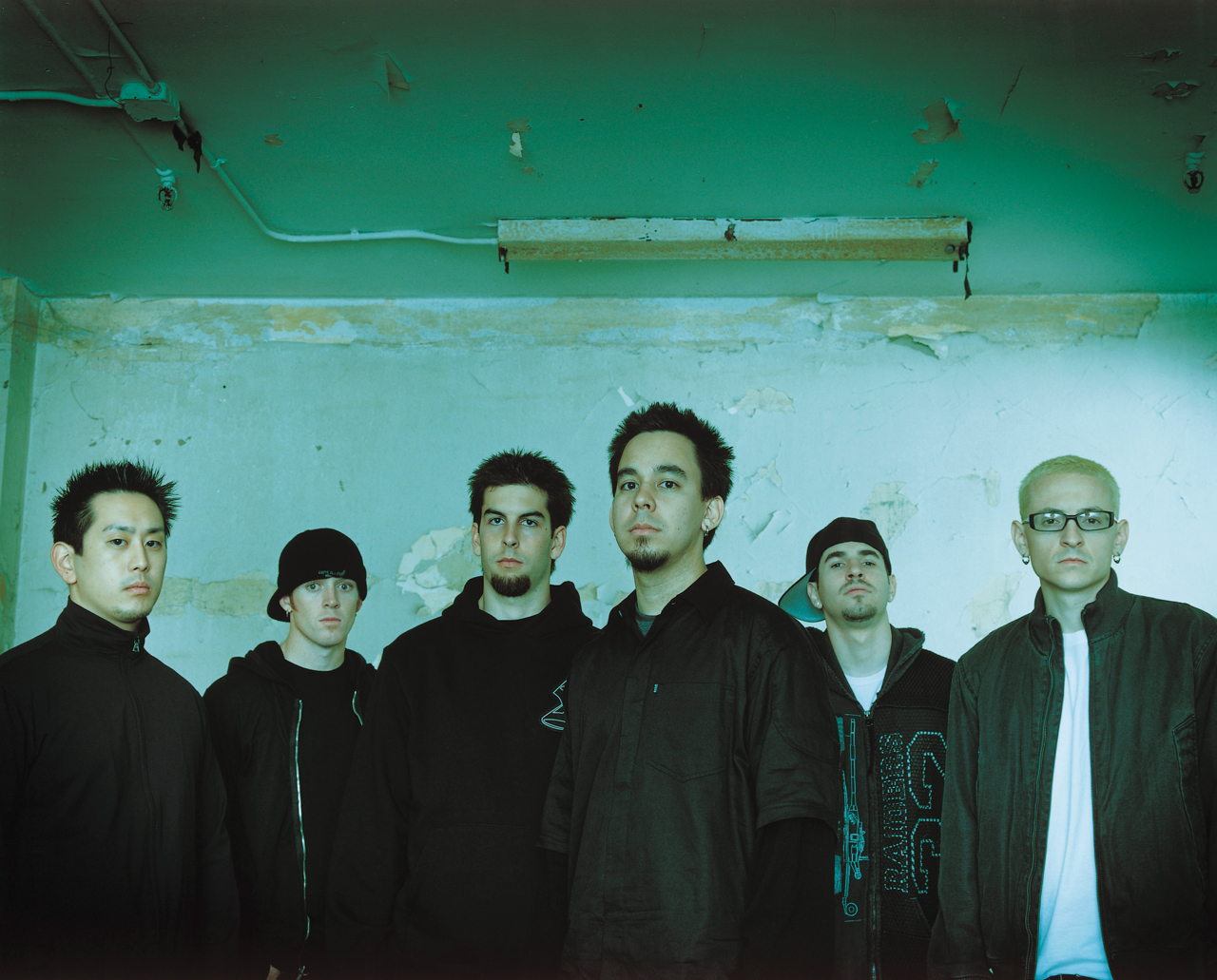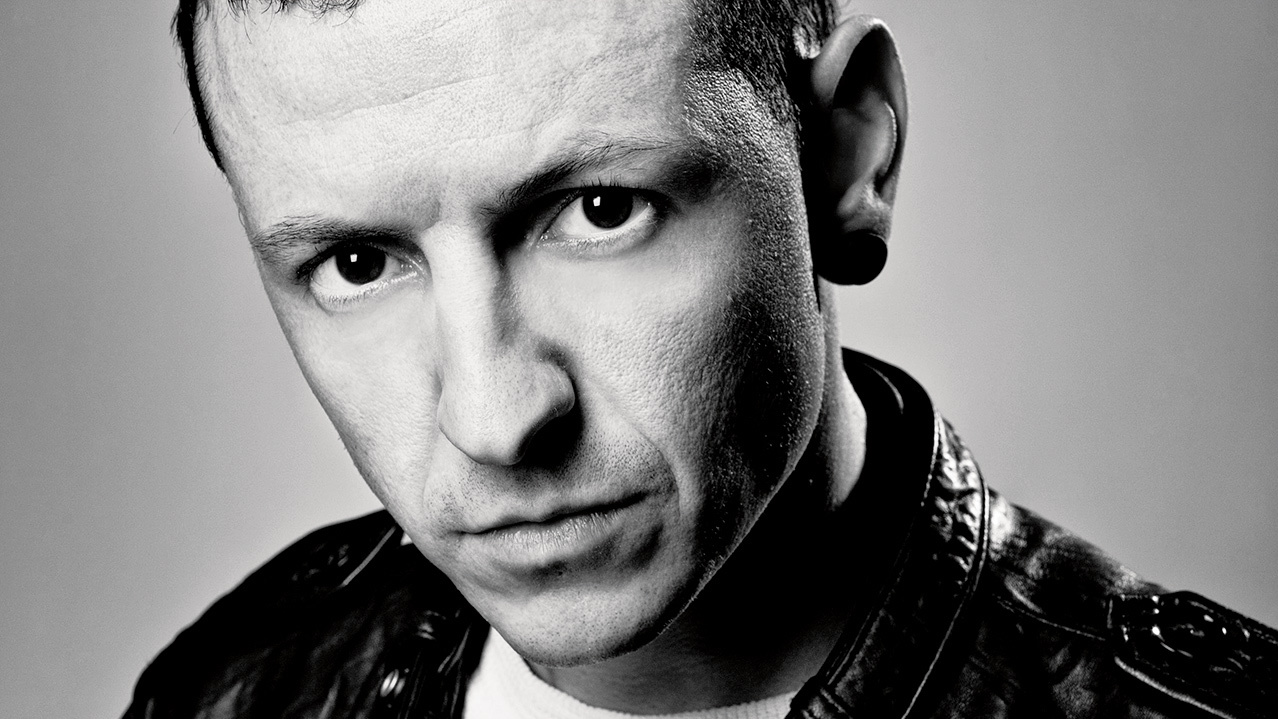Saturday, 20 March, 1999. A skinny 23-year-old in Phoenix, Arizona, signs for a package sent from Los Angeles. It’s his birthday, but the package is no present – more an opportunity. Inside is a demo by a band called Xero. One side is instrumental, the other has singing, and throughout a band is trying to blend hip hop with metal.
The kid in Arizona, Chester Bennington, thinks: ‘Hmmm, I’m not really into the whole hip hop thing. But the music is really cool.’ Then he listens to it again. “I knew I could do it better,” he would admit years later.
The next day he goes into a recording studio. He knows people there, having played in a locally successful band, Grey Daze. He listens to the Xero demo once more, lays his own vocals over the top, and then calls Jeff Blue, the LA record label executive who sent it to him.
“I’m done,” he tells him. “When should I come out to LA?”
“No,” replies Jeff. “We need you to record some vocals on it.”
“Yes, I’ve done that,” says Chester – cocky, self-assured. “Dude, I’m a fucking professional.”
Then he puts the tape in his stereo, places the telephone against a speaker, and blasts it down the line.
“When can you be here?” asks Jeff.
The next day, 9am, Chester is outside Jeff’s LA office. Within weeks, he is Xero’s singer and, after they become Linkin Park, for the next 18 years, he will be the voice, the spirit and the tortured soul at their heart. His death, on July 20, 2017 from an apparent suicide, will stop a generation in its tracks.

That 23-year-old in Phoenix had some problems. “Growing up, for me, was very scary,” he said. As a child, he was abused. It was something that greatly affected his life and his music, and something he later opened up on. “It escalated from a touchy, curious, ‘what does this thing do’ into full-on, crazy violations,” he said. “I was getting beaten up and being forced to do things I didn’t want to do. It destroyed my self-confidence.”
His parents split up when he was 11 years old. His mother left, as did his older sister, while his other sister was never much around. His father, a policeman, worked double shifts to make ends meet. Which just left Chester. “I was pretty much just left at home by myself. It was horrible.”
The abuse continued until he was 13. “The only thing I wanted to do was kill everybody and run away,” he said. “I hated everybody in my family: I felt abandoned. I wrote a lot, I drew a lot and I wrote a lot of poetry.”
It was the poetry that led him to music. Aged 15, he formed the post-grunge band Grey Daze – inspired by his love of bands like Stone Temple Pilots – and says he “knew that music was all I wanted to do”. But it was not the only thing. Chester, in part to relieve the demons brought on by the abuse, in part to pass the time, leaned heavily on drugs.
“I was doing a ton of LSD and a lot of drinking,” he said. “When we couldn’t find acid, we turned to speed. We were smoking it in bongs – I was doing bong-hits of meth. It was ridiculous. Then we’d smoke opium to come down, or I’d drink a lot.”
After an incident when some dealers pistol-whipped his friends, he moved back in with his mother. He swapped speed for alcohol and marijuana. “It kept me off the hard drugs,” he admitted. But it would take over his life.
Following the break-up of Grey Daze, the arrival of Xero’s demo was, Chester felt, his last chance. When he arrived in Los Angeles in 1999, Xero – who had changed their name to Hybrid Theory – were not sure about him.
“He was really skinny, with glasses, and he was wearing this awful butterfly collar shirt that made him look like a cheesy guy from an Arizona nightclub bar,” said Mike Shinoda, the man who wrote almost all of Hybrid Theory’s music. “He was definitely looking for direction. He was looking at us like it was his ticket.”
They were auditioning a number of singers, which did not impress Chester: “I was thinking: ‘You’ve got to be fucking kidding me. Either choose me or don’t, but I’m not sitting about fucking wasting my time.’ I was the best thing they were going to find!”
“There was one guy who never wore shoes and told us he wanted to do stand-up comedy during our show,” admitted Mike, before he finally realised: “Chester sang like a fucking beast.”
Hybrid Theory became Linkin Park after signing to Warner Brothers, with the label concerned the original name was too similar to another act. Mike wrote the music then collaborated on lyrics with Chester, as the new singer explored the abuse of his childhood with a man who was then a virtual stranger.
“There really wasn’t any room for bashfulness,” said Mike. “Some of his lyrics addressed that stuff, so when he and I were talking about the songs, he told me. It was a weird way to get to know each other.”
From those sessions came the juxtaposition at the centre of Linkin Park’s first two albums, Hybrid Theory (whose name they recycled for their debut) and Meteora: the howling fury and angst of Chester’s internal psyche, and the slick assurance of Mike’s rapping. It would be little short of revolutionary.

The guys in Linkin Park had a bet as to how many copies Hybrid Theory would sell in the week of its release in October 2000. The lowest guess was a measly two, the highest was Chester’s 8,000. It sold 47,000 in its first week alone, and has since sold 20million. “We all just went, ‘Holy shit!’” remarked Chester later.
It was a record that came to represent nu metal’s commercial zenith. Though Linkin Park were late to that party – and hated being part of it – they came to define it. Hybrid Theory delivered rage, fear, anguish and paranoia in thrillingly big riffs and choruses. Its commerciality was key: the guitars were heavy and the emotions visceral, but it played to radio. Metal purists may have baulked at it as pop, but it introduced heavy music to an entirely new generation, acting as a point of entry for many who went on to discover a rock and metal subculture, as well as other nu metal bands and, perhaps more importantly, their influences.
Chester became nu metal’s poster boy with his easy-on-the-ear angst, giant vocals and relatably tortured image, even though it was largely Mike’s music (Chester once confessed, “If Mike could sing, I wouldn’t have a job”). It made him uncomfortable. “I had achieved my lifelong dream,” said Chester. “And I was still not happy.”
As Hybrid Theory grew, so did the criticism – some accused Linkin Park of having been put together like a boy band, so suspicious were they of their success. “We blew up so quickly that there was a lot of resentment,” said Chester. “‘Who’s this fucking Backstreet Boys rock band?’ I felt I had to defend myself.”
It started shaping Chester. He became spiky in the press, as did Mike, who admitted to being “bitter”. They felt they needed to prove themselves, which they did by touring relentlessly. And that caused its own problems.
“I respect us for getting through that time without killing each other,” said Chester. “We were playing six nights a week. We weren’t taking care of ourselves.”
He drank hard and smoked weed; the rest of Linkin Park did not. “That segregated me from the band,” said Chester later. “I didn’t feel connected with the guys, we didn’t feel like friends. My then-wife and I were at each other’s throats. It was a pretty miserable experience. My drinking put up a big barricade with the guys but I thought they just didn’t understand me.”
Meteora, Linkin Park’s second album, was made in the midst of this. And though it cemented their status as megastars, within the band, Chester was falling apart.
A snaphot of Chester Bennington in 2004 is not pretty. “I wasn’t leaving my house,” he said. “I would shack up in my closet in the dark and shake all day. I would wake up and have a pint of Jack Daniel’s to calm down, then I’d pop a bunch of pills and go back in my closet and fucking freak out. I was a mess. I was falling through windows, having seizures and going to hospital the whole time. It was fucking ridiculous. I was a total wreck.
“Because I had started touching on my childhood in our songs, I felt like I was doomed to be this lonely person. I thought I would never have a fulfilling relationship with anyone. All I had were the drugs and my alcohol.”
His band staged an intervention, eventually leading to his rehab. “I had no idea I had been such a nightmare,” he said. “I knew I had a drinking problem, a drug problem and my personal life was crazy but I didn’t realise how much that was affecting people until I got a good dose of ‘Here’s-what-you’re-really-like.’
“They said that I was two people – Chester and then that fucking guy. I didn’t want to be that guy, I wanted to be me, so I did everything possible to stay sober.”
By late 2005, he had divorced his first wife, Samantha Olit, and met Talinda Bentley, a former model. “Talinda kept me walking because I couldn’t get there,” he said. “It was a very painful road for her too to watch me try to drink myself to death. I had this amazing feeling of falling in love and feeling it coming back. I’d never really felt that before. It was powerful.”
As Linkin Park returned to the studio for their third album – 2007’s Minutes To Midnight, in which they would begin to move away from nu metal – Chester was working on his own material as a purer channel for his emotions.
“There’s a specific way we write together [in Linkin Park] and it’s not super-personal,” he said. “Things have to take a Mike and I vibe and then the rest of the guys give you notes on the lyrics.”
So his moody, atmospheric rock side-project Dead By Sunrise became a means to detail his journey through addiction and recovery. “I was two different people,” he said. “I was the guy writing very personal songs in Dead By Sunrise and then I’d write Linkin Park songs. Dead By Sunrise was a journal of falling in love and falling apart.”
The one song that crossed the divide was the second track on Minutes To Midnight, Given Up – in which Chester details his alcohol issues. “I’d just gotten back from rehab when I wrote that and the guys were like, ‘This is fucking good, dude’,” he said. “They were letting me just vomit lyrics.”

Minutes To Midnight was a bridging album that allowed Linkin Park to escape their nu metal past and pointed to a future of experimentation. It also relieved pressure. No longer were Linkin Park, and their singer, the voice of the nu metal generation. Instead, emo had changed the landscape.
It was noticeable then – and on Linkin Park’s fourth studio album, 2010’s A Thousand Suns, in which they experimented with moody beats and atmospherics – that they all appeared to relax. Mike, normally intense and protective, became more laidback. Chester, his demons in check, was easy-going. Tanned, fit and healthy, he had a smile on his face in interviews for the first time in years.
“Dead By Sunrise was actually good for Linkin Park because I got all that shit out,” said Chester. “It meant I could make a record with Linkin Park that wasn’t typical. It wasn’t just me talking about my poor, hurt little feelings again.”
They reintroduced guitars on their 2012 fifth album, Living Things, and there was still the sense the band were increasingly happy in their own skin. Musically, they could experiment, but they could still headline festivals in the knowledge the old nu metal belters would buy them leeway from the crowds.
Chester seemed happier: “I just don’t want to be that [drunken] person anymore. I’m a person of faith and I take that very seriously. I pray all the time. That keeps me in check.”
His complex family – he had six children with three partners – was working. “Out of the turmoil of my life, we now have an extremely stable environment,” he said.
Then in 2013, he was offered his dream gig of replacing Stone Temple Pilots’ troubled singer, Scott Weiland. Part of the reason he said yes was that, the more Linkin Park’s music changed, the more Chester was having to find other spaces in their music for himself. Stone Temple Pilots allowed him to be a frontman again.
It was a two-year ride he enjoyed, but which came to an end when touring Linkin Park’s 2014 album The Hunting Party began demanding his time. A return to the energy of their earlier recordings, Linkin Park found an unlikely heavy tone on it in collaborations with Rage Against The Machine’s Tom Morello, System Of A Down’s Daron Malakian and Helmet’s Page Hamilton.
This year’s One More Light changed the band’s sound again, moving them into pop territory with a host of mainstream collaborations, but Chester remained defensive after criticism that they had sold out, telling fans to “move the fuck on”. He continued to be open about his issues, talking of the “bad neighbourhood” in his head that inspired the song Heavy from that album.
The news of Chester’s death on Thursday July 20, 2017, two months after the death of his close friend Chris Cornell and on the Soundgarden singer’s birthday, was an appalling end to a career of rare and shining brilliance.
For a man who had, throughout his life, always been able to stay one step ahead of his demons – whether through music, personal strength or the love of his family – it was a desperate blow that, at 41, they finally caught up with him.
For many, he will be remembered for his presence onstage. In the UK, one of the most defining performances was when the band played Hybrid Theory in full at Download in 2014. Let the cheers and raucous reaction serve as a memory for one of the defining talents of an age.
You’re not alone
There are many organisations who can help those struggling with their mental health
Mind: Mind provides advice to anyone experiencing mental health problems.
www.mind.org.uk / info@mind.org.uk / Tel: 0300 123 3393 / Text: 86463
Samaritans: Samaritans offer a free, confidential, non-judgmental service for people to talk through their worries.
www.samaritans.org / jo@samaritans.org / Tel: 116 123
Help Musicians UK: The charity is leading a campaign to find solutions to mental health issues in the music industry. It offers support to musicians of all genres and stature.
www.helpmusicians.org.uk / Tel: 020 7239 9103
Jesse Leach appalled at lack of respect shown to Chester Bennington online

